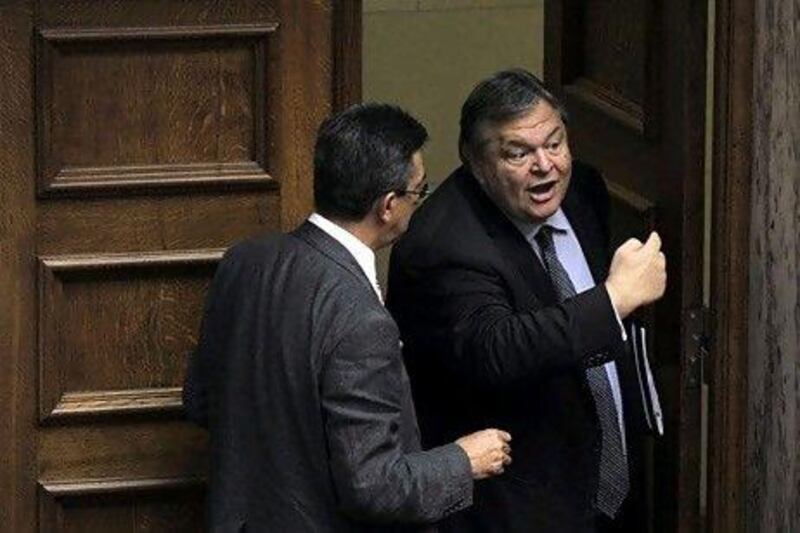European banks urgently need big injections of capital to help to cope with as much as €300 billion (Dh1.5 trillion) of credit risk that threatens to strangle their ability to lend and in turn push already troubled economies closer to default, the IMF warned last night.
The dire warning signals even greater trouble ahead for crumbling euro-zone economies which, the IMF said, could come under even more pressure to default on their debt without the support of a robust banking sector.
"A number of banks must raise capital to help ensure the confidence of their creditors and depositors," the IMF wrote in its Global Financial Stability Report. "Without additional capital buffers, problems in accessing funding are likely to create deleveraging pressures at banks, which will force them to cut credit to the real economy."
But the IMF's words seemed to fall on deaf ears in Greece where workers in the private sector called for countrywide strikes to start next month.
Politicians in Athens, meanwhile, continued to squabble over a solution to the country's economic strife.
They began debating plans for US$6bn (Dh22bn) in fresh budget cuts yesterday as emergency talks got under way with creditors.
The cuts are likely to lead to thousands of job losses across the country that will be needed if it is to receive its next bailout payment.
Setting the tone for the make-or-break debate in parliament, Evangelos Venizelos, the Greek finance minister, told legislators more reforms were needed to save the economy from meltdown.
"We have not fully understood the danger [we face] that the national economy could cease operating," he said.
If it doesn't meet budget targets, Greece has been told it may not receive its latest $8bn slice of financing next month from the so-called troika - the EU, the European Central Bank and the IMF. Without the funds, Greece will be unable to pay its bills by the middle of next month.
The government on Tuesday said negotiations with the troika were progressing, without indicating a deal for the next bailout was close.
Politicians fear that already hard-pressed Greeks may be unwilling to consider another round of tough austerity measures. Strikes and mass protests signalled public unhappiness with previous budget cuts.
Investor concern about a lack of resolution to Greece's troubles curbed any enthusiasm before a two-day meeting of the US Federal Reserve that began on Tuesday. European markets were trading lower during afternoon trading, with the Stoxx Europe 600 down 0.77 per cent at 227.33. In Frankfurt, the Dax was 1.42 per cent down at 5,492.45, the FTSE 100 in London was 0.60 per cent lower at 5,331.35, and Paris's CAC 40 was 0.43 per cent down at 2,971.21.
Earlier, the MSCI Asia Pacific Index rose 0.1 per cent to 117.99 after a gauge of economic indicators suggested China's economy was proving resilient to the euro-zone debt crisis and slowing US growth. In New York, Standard & Poor's 500 Index futures fell 0.3 per cent.
In currency markets, the dollar fell to a one-month-low against the yen.
"Markets are quite reluctant to come back after the big sell-off last month," said Mike Lenhoff, the chief strategist at Brewin Dolphin in London. "The potential of stimulus from the Fed has been in the market for a while and investors don't seem convinced it will do anything."
Global stocks have been in the doldrums over the past two months as anxieties persist about the European sovereign debt crisis spreading and slowing growth in the US.
Analysts expected the Fed to announce proposals to reshuffle its portfolio towards longer-dated bonds in an effort to send long-term interest rates even lower. The central bank has already pledged to keep interest rates at near record lows for the next two years.
The US economy has been cooling since the end of a $600bn bond-buying programme in June.





